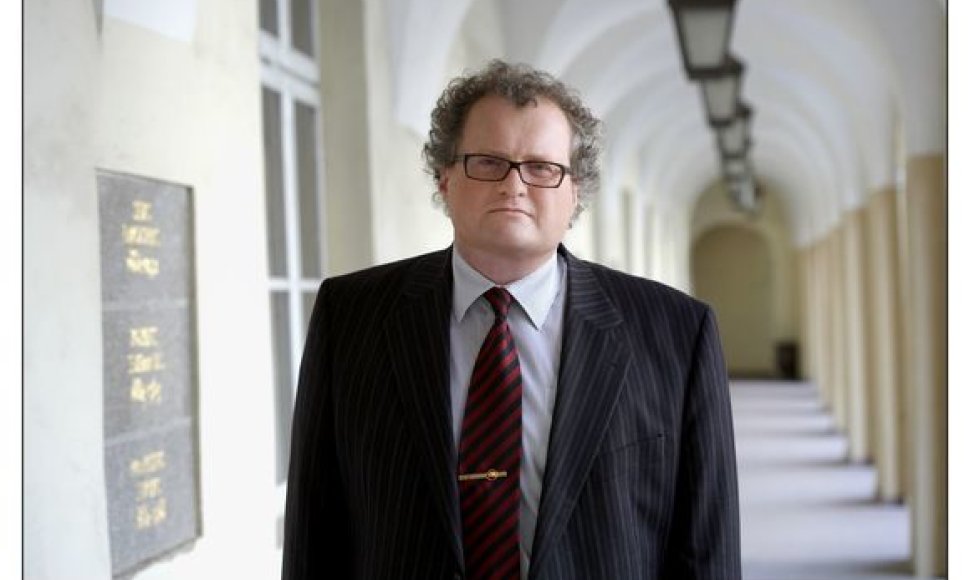For instance, Schopflin writes: “Whereas no one would look twice at an analysis of the United States by someone who knows no English, their counterparts dealing with Central Europe have no such qualms. They do not learn Polish or Czech or Hungarian, but rely on translators and will accept what may be a very partial picture of Central European reality (and one they cannot verify). As a result, the Central European voice is weaker, and this is never recognized. Those with more powerful voices shout loudest and drown out the weaker ones.”
I have analyzed this sort of discursive handicap more than once. In fact, if you happen to be an American, a Brit, or a Frenchman, you talk prose simply in introducing yourself. Yet if you are a Lithuanian, a Latvian, or an Estonian, you are obliged to work hard telling stories about your country or introducing your counterparts to the history of your country. This is so, since you are a non-person in the quick identification system which is part of mass narratives in the West.
Becoming a hostage of your country’s politics or economic performance is a curse of modernity due to the fact that predominant historical-political narratives and interpretations that sell well come from the West.
For a person from Tuscany, it would never occur that she or he has to insist on the fact that Italy is Europe. Yet if you are a Baltic person amidst good people from big countries who are not at their best when confronted by history and culture, the status of your country can be easily put into question. Far from a joke or an innocent story, this reflects the asymmetry of power and prestige not only in the world of public affairs, but in the world of ideas as well. It does. You are measured and perceived merely by your purchasing power or by your CV, once your country does not have the quick identification code in terms of its economic performance or political power.
Schopflin is absolutely right concerning the absurdity of disparity in the area of competence which exists between the West and Central and Eastern Europe. If you are not French, even if you are fluent in the language and qualified in French philosophy or history of ideas, not to mention French literature, you will never get a senior post at a French university. The same applies to Great Britain – no matter how brilliant foreign researchers of Shakespeare or Marlowe or Hobbes or of any other symbolic gatekeeper of English culture could be, they will never get a post at a British university due to their continental upbringing and “nebulous” educational system. Yet a qualified French or British scholar is always welcome at any decent Central and Eastern European university, including in such areas as Central and Eastern European studies, that is, the symbolic center of identity.
The same with the USA – true, this country used to be more open to foreign talents in the area of humanities and social science disciplines. Some disciples of Mikhail Bakhtin, Yuri Lotman, or Sergei Averintsev – major humanists of the world who were all of Russian background – got jobs in the USA. Yet make no mistake: during the Cold War era the Soviet Union, i.e. Russia, was an archenemy whose cultural codes and nuances of history and identity had to be studied. Much of the West’s infatuation with Islamic studies nowadays stems from a similar, if not identical, impulse.
Most telling is the fact that Central and Eastern Europe eagerly emulates the British system of academic management, which is merely about the commodification of universities and education initiated in the era of Margaret Thatcher.
Eastern Europe was full of men and women of ideas, who spoke several languages and made translations of William Shakespeare, Francois Villon, or William Blake, that were second to none in the world (among them Boris Pasternak, Ilya Ehrenburg, Samuil Marshak), yet these people were perceived as lesser Europeans or, at best, poor cousins of Europeans. Becoming a hostage of your country’s politics or economic performance is a curse of modernity due to the fact that predominant historical-political narratives and interpretations that sell well come from the West. If you are not a product of a Western educational system and if you have not been molded by Western institutions of higher education, you will have to find a specific niche not to challenge or otherwise put into question the narratives that reflect the existing distribution of power and prestige.
True, there is such an area as Central and Eastern European studies where Central and Eastern Europeans can fulfill themselves in the West due to their obvious advantages over their Western counterparts in terms of a good command of languages and local sensibilities. The trouble is that yet another Europe does not have such symbolic gatekeepers that would prioritize their interpretations and perspectives. But if it did, it would be immediately qualified as xenophobic and provincial.
Unfortunately, Central and Eastern Europe’s lack of strategy in the area of the humanities worsens the state of affairs. A rather similar situation in Western Europe is small consolation, as the asymmetry and disparity only widens the gulf and works for the benefit of Western narratives and institutions. This applies to the Baltic region as well, alas. If we don’t reverse this situation, we will be at risk of self-inflicted intellectual and cultural colonialism.
Most telling is the fact that Central and Eastern Europe eagerly emulates the British system of academic management, which is merely about the commodification of universities and education initiated in the era of Margaret Thatcher. It is highly unlikely that this would help eliminate the aforementioned disparity and asymmetry. We should not deceive ourselves.
Leonidas Donskis, Ph.D., is a Lithuanian Member of the European Parliament.












